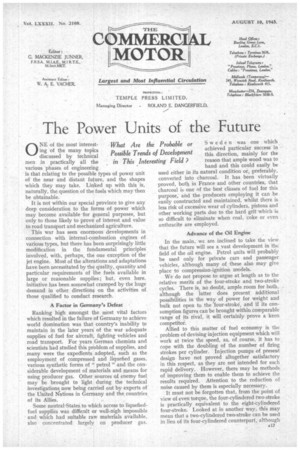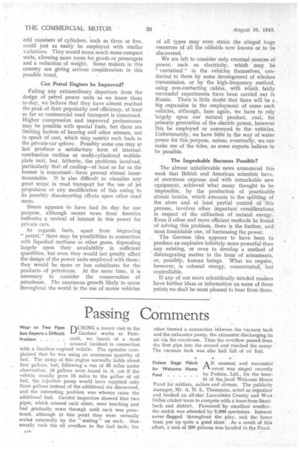The Power Units of the Future
Page 19

Page 20

If you've noticed an error in this article please click here to report it so we can fix it.
ONE of the most interesting of the many topics discussed by technical men in practically all the various phases of engineering is that relating to the possible types of power unit of the near and distant future, and the shapes which they may take. Linked up with this is, naturally, the question of the fuels which may then be obtainable.
It is not within our special province to give any deep consideration to the forms of power which may become available for general purposes, but only to those likely to prove of interest and value to road transport and mechanized agriculture.
This war has seen enormous developments in connection with internal-combustion engines of various types, but there has been surprisingly little modification in the fundamental principles involved, with, perhaps, the one exception of the jet engine. Most of the alterations and adaptations have been necessitated by the quality, quantity and particular requirements of The fuels available in large or reasonable supplies ; but, even here, initiative has been somewhat cramped by the huge demand in other directions on the activities of those qualified to conduct research.
A Factor in Germany's Defeat Ranking high amongst the Most vital factors which resulted in the failure of Germany to achieve world domination was that country's inability to maintain in the later years of the war adequate supplies of fuel for aircraft, fighting vehicles and road transport. For years German chemists and scientists had studied this problem of supplies, and many were the expedients adopted, such as the employment of compressed and liquefied gases, various synthetic forms of " petrol" and the considerable development of materials and means for using producer gas. Other sources of enemy fuel may be brought to light during the technical investigations now being carried out by experts of the United Nations in Germany and the countries. of its Allies.
Some neutral-States to which access to liquefiedfuel supplies was difficult or well-nigh impossible and which had suitable raw materials available, also concentrated largely on producer gas. 'What Are the Probable or Sweden was one which Possible Trends of Development this direction, mainly for the , in This Interesting Field ? reason that ample wood was to hand and this could easily be used either in its natural condition or, preferably, converted into charcoal. It has been virtually proved, both in France and other countries, that charcoal is one of the best classes of fuel for this purpose, and the producers employing it can be easily constructed and maintained, whilst there is less risk of excessive wear of cylinders, pistons and other working parts due to the hard grit which is so difficult to eliminate when coal, coke or even anthracite are employed.
Advance of the Oil Engine In the main, we are inclined to take the view that the future will see a vast development in the field of the oil engine. Petrol units will probably be used only for private cars and passenger vehicles, although many of these also may give place to compression-ignition models.
We do not propose to argue at length as to the relative merits of the four-stroke and two-stroke cycles. There is, no doubt, ample room for both, although the latter does present additional possibilities in the way of power for weight and bulk not open to the lour-stroke", and if its consumption figures can be brought within comparable range of its rival, it will certainly prove a keen competitor.
Allied to this matter of fuel economy is the problem of devising injection equipment which will work at twice the speed, as, of course, it has to cope with the doubling of the number of firing strokes per cylinder. Injection pumps of present design have not proved altogether satisfactory in this respect, as they are not intended for such rapid delivery. However, there may be methods of improving them to enable them to achieve the results required. Attention to the reduction of noise caused by them is especially necessary.
• It must not be forgotten that, from the point of view Of even torque, the four-cylindered two-stroke is practically equivalent to the eight-cylindered four-stroke. Looked at in another way, this may mean that a two-cylindered two-stroke can be used in lieu of its four-cylindered counterpart, although odd numbers of cylinders, 'such as three or five, could just as easily be employed with similar variations. They would mean much more compact units, allowing more room for goods or passengers and a reduction of weight. Some makers in this country are giving serious consideration to this possible trend.
. Can Petrol Engines be Improved?
Failing any extraordinary departure from the design of petrol power units as we know them to-day, we believe that they have almost reached the peak of their popularity. and efficiency, at least so far as commercial road transport is concerned. Higher compression and improved performance may be possible with special fuels, but there are limiting factors of bearing and other stresses, not to speak of cost, which may restrict such fuels to the private-car sphere. Possibly some. one may at last producea satisfactory form of internalcombustion turbine or multi-cylindered wobbleplate unit, but, hitherto, the problems involved, particularly that of cooling-----at least so far as the former is concerned—have proved almost insurmountable. It is also difficult to visualize any great scope in road transport for the use of jet propulsion or any modification of this owing to its possibly disconcerting effects upon other road users.
Steam appears to have had its day for our purpose, although recent news from America indicates a revival of interest in this power for private cars.
As regards fuels, apart from improving " petrol," there may be possibilities in connection with liquefied methane or other gases, depending largely upon their availability in sufficient quantities, but even they would not greatly affect the design of the power units employed with them ; they would be more or less substitutes for the products of petroleum. At the same time, it is necessary to consider the conservation of petroleum. The enormous growth likely to occur throughout the world in the use of motor vehicles of all types may even strain the alleged huge resources of all the oilfields now known or to be discovered.
We are left to consider only external sources of power, such as electricity, which may be " contained " in the vehicles themselves, conducted to them by some development of wireless transmission, or by the high-frequency method, using non-contacting cables, with which fairly successful experiments have been carried out in Russia. There is little doubt that there will be a big expansion in the employment of some such vehicles, although, here again, we have to rely largely upon our natural product, coal, for primary generation of the electric power, however this be employed or conveyed to the vehicles. Unfortunately, we have little in the way of water power for this purpose, unless, eventually, we can make use of the tides, as some experts believe to be possible.
The Improbable Becomes Possible?
The almost unbelievable news announced this week that British and American scientists have, at enormous expense, and with remarkable new equipment, achieved what many thought to be impossible, by the production of practicable atomic bombs, which amounts to the splitting of the atom and at least partial control of this process, involves other important considerations in respect of the utilization of natural energy. Even if other and more efficient methods be found of solving this problem, there is the further, and most formidable one, of harnessing the power.
The German idea appears to have been to produce an explosive infinitely more powerful than any existing, or even to develop a method of ' disintegrating matter in the form of armaments, or, possibly, human beings. What we require, however, is colossal energy, concentrated, but controllable.
If any of our more scientifically minded readers have further ideas or information on some of these points we shall be most pleased to hear from them.




















































